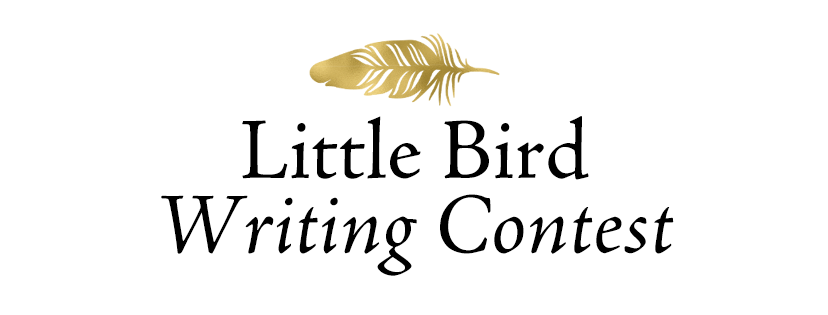Lady Luck favours the one who tries.


Today, The Little Bird Contest officially opens!
[Note: The 2017 Little Bird contest is now closed. You can read the winning stories here.]
This is also the last month of my mini-sabbatical. But this month, instead of highlighting some of my old favourite letters, I’ve invited four special guest authors — all of them Little Bird contest winners — to write for us.
I wanted to check in with a few of the voices we’ve heard in past contest years, and find out what they’ve been up to since their contest win.
Today is the first in the series, and it’s an extra-special one, to kick off Little Bird season.
I asked Lana Pesch, one of our amazing teachers (also an amazing writer, and Little Bird runner-up published in both Little Bird Stories Vol. I and II) to write a letter to a student who graduated from her class last year. Why do you think they should enter the contest? I asked Lana. This is her answer.
It’s written to a Story Intensive alumna, but I think any writer who is considering publication should read it. Enjoy!
xo
 Dear Writer, Congratulations on everything that you have accomplished so far with your writing. Are you as pleased and excited as I am? I hope so. You should be proud. Your work is solid. Your stories are unique and original. You have written only what you can write.
Dear Writer, Congratulations on everything that you have accomplished so far with your writing. Are you as pleased and excited as I am? I hope so. You should be proud. Your work is solid. Your stories are unique and original. You have written only what you can write.
But, you already know this.
Remember the theme for The Story Intensive 2016? It was: you get to do whatever you want. Now you get to do just that. You get to submit your work wherever you want.
You are entering a new phase with your relationship with writing and it might feel weird or scary, or maybe you’re nervous. Completely normal. You are taking your writing to the next level and, like any relationship, it probably feels risky. It should. Anything can happen. I encourage you to use that energy to fuel your next steps. Try and channel your nervous energy — if this is your experience — into creating self-confidence. You know you have something to say and your stories are ready to be shared. You got this.
Also, this next stage is about respect. Self-respect. And the responsibility you have to your work. Think about all the hard work you’ve done, how far you have come, and how much you have grown. You are a writer now. Sending your work to contests and journals and magazines is what it means to be accountable as a writer. This is what it feels like to be a writer.
The good news is that those contests and journals and magazines need you as much as you need them. Contest deadlines and editorial calendars are good ways to keep you accountable but the reality is, it takes as long as is takes. At some point, someone is going to be in tune with what you are doing. Full disclosure: People kept telling me this but I did not believe it until I had some interest from a publisher. The not so good news is that you have no idea when or where this will happen. Me neither. But this is where the Law of Serendipity comes into play. Lady Luck favours the one who tries. [Barbara Oakley, A Mind for Numbers: How to Excel at Math and Science.]
A word on rejection. When you submit your work, you will meet with rejection. Perhaps often and repeatedly. Rejection is part of the process. Rejection does not equal failure. My advice is, get used to it. There are many reasons why your work will get rejected and many of them are out of your control. Examples: there can only be one winner, it’s not the right time, not the right fit, personal taste and biases, too dark, not dark enough, too bright, not bright enough, too funny, not funny enough…you get the idea. There are hundreds of other reasons that are beyond your control, so please do not take rejection personally. Easier said than done, I know. But believe me, I know. My road to publication was this: rejection, rejection, rejection, rejection, rejection, rejection, rejection, contest runner up, rejection, rejection, rejection, rejection, rejection, rejection, contest runner up, rejection, rejection, rejection, rejection, rejection, contest winner, rejection, rejection, rejection, rejection, rejection, book deal.
Your journey will look different. It will be yours. Own the experience. But more to the point, enjoy it. The path will likely be longer than you think.
Worrying about what will happen after a story is sent is pointless, futile, and useless. Please try and channel every ounce of that energy into your next piece of writing.
And don’t just take it from me. If you do see rejection as failure, in an interview from the Fiction Writers Review, Bret Anthony Johnston says this: "You learn to expect failure. You learn to embrace it. You learn how to trust the process, how to push forward through pain and disappointment and frustration. You learn how to get back up. I’ve seen some incredibly talented writers fall down and stay down. It’s never made sense to me."
Failure is not a bad thing. Failure is part of learning process, just like rejection.
Author Rebecca Lee, judge for the 2014 Little Bird contest quoted a friend of hers who said, “Every time you send your manuscript to a contest or to submission for publication or to a literary journal, imagine you are sending it to Mars and you have no idea what the feedback is going to be and then carry on. Carry on as fast as you can. You know, the next day you have to be back on another project otherwise you are thinking about the thing that is out of your control.” Focus on what is happening at your writing desk, not someone else’s desk.
And a favourite quote that helps me not only in writing but also in life from my dearly departed Uncle Steve, “We have no control over 90% of the things in our life, so focus on the 15% you can control.” Math wasn’t his strong point.
Of course, you do have the option to keep your writing saved on your computer. You can go back and make just one more edit, or tinker with those last few sentences, again, one last time. You can print your pages and tuck them safely in a drawer where they will never reach another living soul. But I don’t think that’s what you want is it?
“It takes practice. It takes work, years of work. And then what you write may never get published. Even if it does it almost certainly won’t ever make you enough to live off of. But if it’s what you want to do, nothing, nothing in the world, can give you a sweeter reward than doing it, doing the work itself—and then knowing you did it, you got the words right, you made a story up and told it truly.” — Ursula K. LeGuin, Making Up Stories
Writing is a nutty thing to do isn’t it? Bunch of weirdoes sitting around dreaming up stories, pinching people’s conversations and mannerisms and fashion choices. I know you know what I mean, because you can’t not do it. Now away we go.
With admiration and respect,
Lana


0 comments
Leave a comment